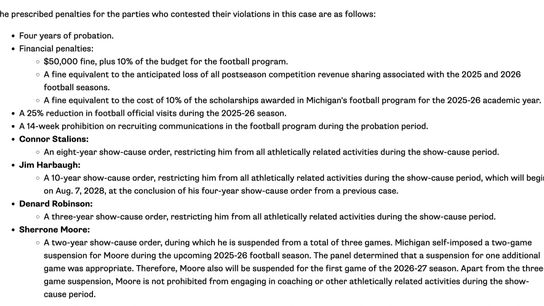The NCAA’s Committee on Infractions found specifically that Jim Harbaugh’s University of Michigan football “program had a contentious relationship with Michigan’s Compliance office” and also cited the discovery of Connor Stalions’ spy-ring, sign-stealing scheme occurred 56 times across three college football seasons.
Both Kay Norton, chairperson of the COI, and Norman Bay, public member of the COI, outlined Harbaugh’s patterned refusal to cooperate at any point in the NCAA’s almost-two-year investigation into Michigan’s football program, which the COI said benefitted from the Stalions-led, self-dubbed “KBG’ scandal in the 2021, ’22 and ’23 seasons.
"You don't put together a network of individuals called the KGB that records 'dirty film' where the costs is in the tens of thousands of dollars unless you intend to gain a substantial competitive advantage,” Bay said on Zoom.
The scheme was brought to light in fall 2023, but the NCAA’s COI on Friday revealed it discovered 56 instances that covered 52 games and also featured Michigan’s attempts to steal the signs of 13 different opponents.
Harbaugh was handed an additional 10-year show-cause penalty atop the previous four-year banishment he received last year from the NCAA for a separate investigation into the school’s illicit recruiting activities.
Stalions, who’s been allowed to coach Michigan high school kids since his unceremonious exit from the Wolverines program in fall 2023, was banished for eight years.

The “show-cause” penalty is the NCAA’s most severe individual punishment and holds that an member institution that wishes to hire someone under the parameters of a show-cause penalty must “show cause” as to why that school needs to hire the individual(s) in question.
Both Bay and Norton stopped short of admitting frustration with Harbaugh’s lack of cooperation but noted it was a definite factor in what the COI termed as severe punishment against Michigan.
The COI was told an additional individual helped fund the scheme – Stalions, remember, was first a part-time employee and then among the lowest-paid staff members once he was a full-time analyst – but it could not corroborate that claim and found Stalions’ credibility in question as it specifically pertained the scheme’s finances.
“There was evidence and a record suggesting that Stalions told an intern or others that there was an individual who provided funding to him, but Stalions himself denied receiving funding from any other person,” the NCAA reps said on the Zoom. “Enforcement staff was not able to substantiate where the money came from.
“In my view, it raised a question about Stalions’s credibility but we do not know where the money came from.”
The NCAA clarified, in part, that current Michigan head coach Sherrone Moore would be suspended two games this year and an additional game in 2026. The COI found that Moore lied about the 50-plus pages of text messages he exchanged with Stalions that Moore initially deleted from his phone.
“The University and Coach Moore proposed a two-game suspension for the 2025 season,” officials said. “In light of the totality of circumstance here and in light of the record developed and presented, we determined a more appropriate penalty would add an additional one-game suspension for the 2026 season.”
In other words, the NCAA wants the cheating stink to linger on Michigan into next year; the financial penalties included a flat, $50,000 and 10% of Michigan’s football budget. The total of those figures across two years is expected to result in a financial penalty between $20-30 million for the Wolverines.
Worth noting: Michigan spent more than $20 million just on football coaches’ salaries in 2024, per the school’s public budget report.
